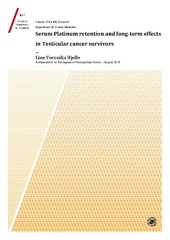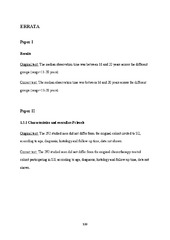| dc.contributor.advisor | Haugnes, Hege Sagstuen | |
| dc.contributor.author | Hjelle, Line Veronika | |
| dc.date.accessioned | 2018-09-27T07:33:13Z | |
| dc.date.available | 2018-09-27T07:33:13Z | |
| dc.date.issued | 2018-08-30 | |
| dc.description.abstract | Today, the majority of testicular cancer patients are cured, and are expected to live 40 to 50 years after treatment. Some of these men experience late effects due to cisplatin treatment, of which second cancer and cardiovascular disease are among the most serious and potentially life threatening. Given the continuously increasing number of cancer survivors, in-depth investigations of treatment-induced toxicities and their mechanisms, are particularly important.
Cisplatin eliminates slowly from the body, and small amounts of platinum, the metal compound of cisplatin, are retained for years after treatment. We have used inductively coupled plasma mass spectrometry to analyze serum platinum levels and its associations with cisplatin related late effects in testicular cancer survivors. In order to assess its elimination, we measured platinum levels at 12 and 20 years after treatment.
We document increased platinum levels median 20 years after cisplatin treatment, and demonstrate a decline in platinum levels for most men. Interestingly, 14 % had an increasing platinum level during follow-up. We found associations between the retained platinum and increased odds for second cancers, tinnitus and reduced endocrine gonadal function, but not with cardiovascular disease. Associations with neuro-ototoxicities attenuated when adjusting multivariable models with cumulative cisplatin dose. A platinum decline was associated with worsening of tinnitus, paresthesias in hands and reduced risk of second cancers. Cumulative cisplatin dose was not associated with second cancer risk. The associations between retained platinum and late effects may be due to the platinum’s ongoing damage to organs. We hypothesize that different mechanisms are involved according to whether the cisplatin-induced late effects occurs during or shortly after chemotherapy, as with neuro- ototoxicities, or several years after treatment, as with second cancers. Whether the observed increase in serum platinum for some of our patients, are a result of environmental exposure through pollution, needs further investigation. | en_US |
| dc.description.doctoraltype | ph.d. | en_US |
| dc.description.popularabstract | Testicular cancer, the most prevalent malignancy in young men, has a remarkable survival due to chemotherapy treatment with cisplatin. For some, cure comes with the expense of late effects due to treatment. Cisplatin eliminates slowly from the body, and small amounts of platinum, the metal compound of cisplatin, are retained in the body for years after treatment. In our study, testicular cancer survivors have higher platinum levels up to three decades after cisplatin treatment, compared with controls. Our results showed associations between the retained platinum and increased second cancer, tinnitus, and hypogonadism. A larger platinum decline was associated with worsened tinnitus and paresthesias, and a reduced risk of second cancers. The associations with the retained platinum and late effects may be due to the platinum’s ongoing damage to organs. | en_US |
| dc.identifier.uri | https://hdl.handle.net/10037/13874 | |
| dc.language.iso | eng | en_US |
| dc.relation.haspart | <p>Paper I: Hjelle, L.V., Gundersen, P.O.M, Oldenburg, J., Brydøy, M., Tandstad, T., Wilsgaard, T., … Haugnes, H.S. (2015). Long-term Platinum Retention After Platinum-based Chemotherapy in Testicular Cancer Survivors: A 20-Year Follow-up Study. <i>Anticancer Research</i>, 35(3), 1619-1625. Full text is not available in Munin due to publisher restrictions. The published version is available at <a href=http://ar.iiarjournals.org/content/35/3/1619.full>http://ar.iiarjournals.org/content/35/3/1619.full.</a><p>
<p>Paper II: Hjelle, L.V., Bremnes, R.M., Gundersen, P.O.M., Sprauten, M., Brydøy, M., Tandstad, T., … Haugnes, H.S. (2016). Associations between long-term serum platinum and neurotoxicity and ototoxicity, endocrine gonadal function, and cardiovascular disease in testicular cancer survivors. <i>Urologic oncology</i>, 34, 487.e13–487.e20. Also available at <a href= http://dx.doi.org/10.1016/j.urolonc.2016.06.012>http://dx.doi.org/10.1016/j.urolonc.2016.06.012.</a><p>
<p>Paper III: Hjelle, L.V., Gundersen, P.O.M., Hellesnes, R., Sprauten, M., Brydøy, M., Tandstad, T., … Haugnes, H.S. (2018). Long-term serum platinum changes and their association with cisplatin-related late effects in testicular cancer survivors. (Manuscript). Published version available in <i>Acta Oncologica</i>, <a href=https://doi.org/10.1080/0284186X.2018.1473641>https://doi.org/10.1080/0284186X.2018.1473641. </a><p> | en_US |
| dc.rights.accessRights | openAccess | en_US |
| dc.rights.holder | Copyright 2018 The Author(s) | |
| dc.rights.uri | https://creativecommons.org/licenses/by-nc-sa/3.0 | en_US |
| dc.rights | Attribution-NonCommercial-ShareAlike 3.0 Unported (CC BY-NC-SA 3.0) | en_US |
| dc.subject | VDP::Medisinske Fag: 700::Klinisk medisinske fag: 750::Onkologi: 762 | en_US |
| dc.subject | VDP::Medical disciplines: 700::Clinical medical disciplines: 750::Oncology: 762 | en_US |
| dc.title | Serum Platinum retention and long-term effects in Testicular cancer survivors | en_US |
| dc.type | Doctoral thesis | en_US |
| dc.type | Doktorgradsavhandling | en_US |


 English
English norsk
norsk



